Adore Beauty's plan to take on MECCA, Sephora and Priceline
Can a data-driven bricks-and-mortar beauty store compete with the market's major players?
Adore Beauty opened its first physical store in Melbourne today. It's a landmark moment for Australia's first beauty e-commerce site, which has been around since it was founded by 21-year-old Kate Morris in 1999. But this isn't just another online retailer going brick-and-mortar – with more than two decades of online retail experience, Adore Beauty has gathered an enviable amount of intel on who its customer is, where they live and what they want to buy.
So can this trove of data give Adore Beauty a unique advantage in physical retail?
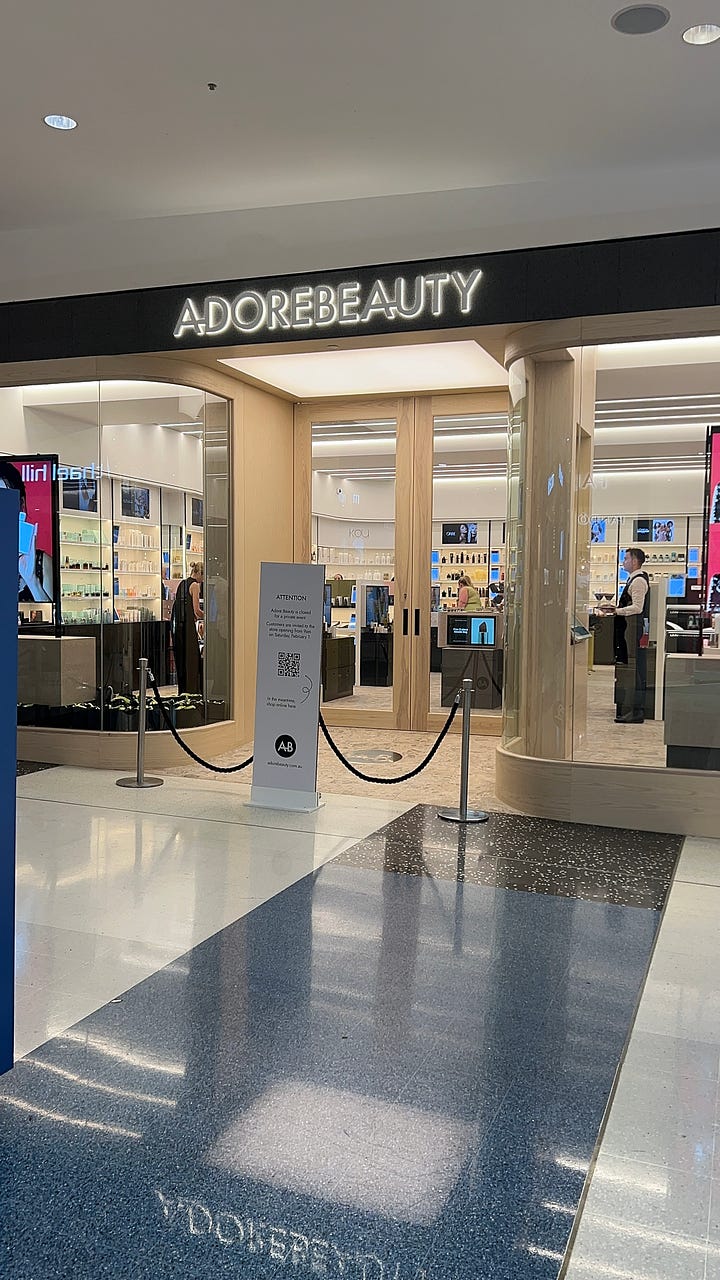
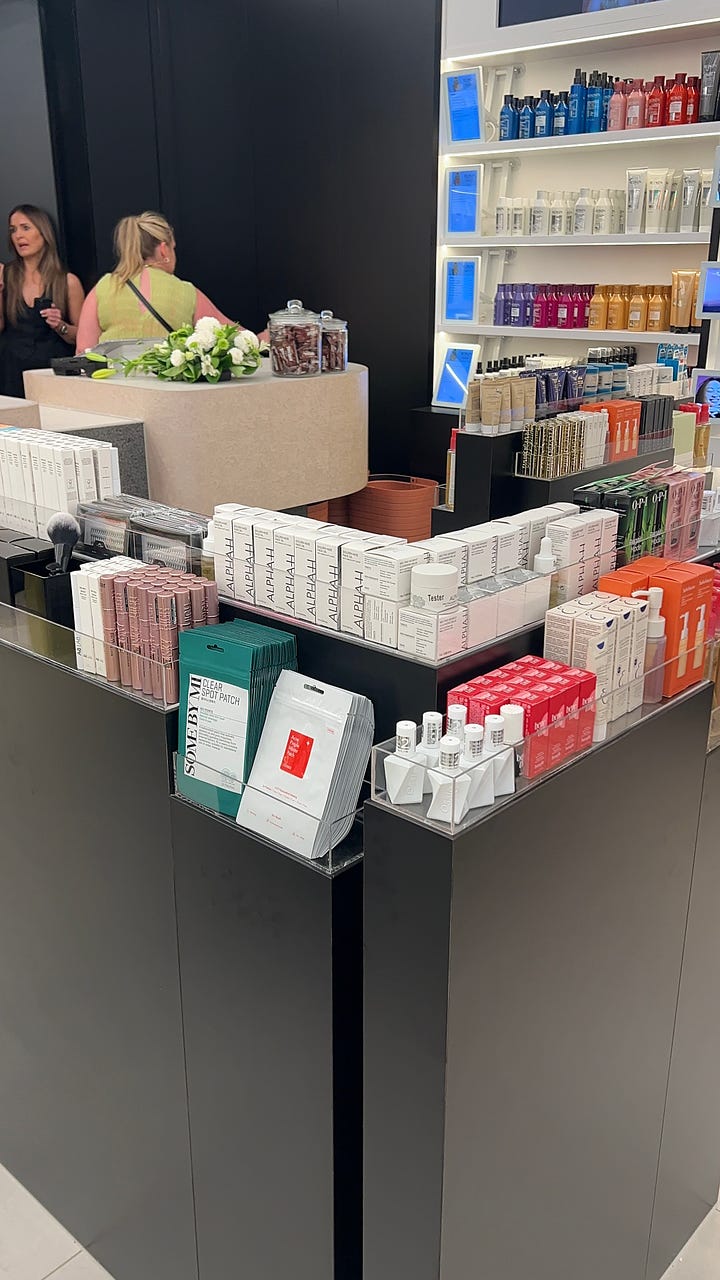
Ahead of the opening at Westfield Southland shopping centre, I flew to Melbourne to speak with the team and experience the store firsthand. In the lead-up, I'd been chatting to others in the industry about what it might be like, the brands it would stock, and how it would fare in the competitive beauty retail space. What I was most fascinated by was the prospect of a data-driven bricks-and-mortar beauty store.
The default query I got about the store was whether it'll ever be able to compete with the likes of MECCA and Sephora. Is that what Adore Beauty is even going for, though? I'm not so sure. Here's where I think their focus is instead.
The 10% advantage
Recent research on the online market share of cosmetics retail in Australia revealed that Adore Beauty holds 10 per cent. Despite its leading position as the largest market player in Australian beauty retail, MECCA holds a 6 per cent share, followed by Sephora at 4 per cent (would you believe that Strawberrynet isn't far behind, at 2 per cent?! Truthfully, I'm now under obligation to do a deep-dive on the ambiguous appeal of this industry-blacklisted site).
This online dominance means Adore Beauty has been able to leverage 25 years of customer information in ways its competitors haven't. While MECCA and Sephora rely on loyalty programs to piece together insights about their otherwise anonymous in-store shoppers, Adore Beauty's data tells a complete story about who their customers are and what they want.
This means that there's far less guesswork involved in Adore Beauty's offline business decisions. From the specific brand and product mix that is stocked in each store to the lease on every location, Adore Beauty is directly responding to its established customer behaviour in the area. Which explains why their first store isn't where you might expect.
At almost 20kms from Melbourne's CBD, Cheltenham's Westfield Southland isn't the most obvious choice. But the store itself is anything but suburban – sleek marble and curved glass house discrete AI features that track consumer behavior, while digital pricing panels sync with online prices in real-time. CEO Sacha Laing tells me the location was very considered and deliberate. "This is a heartland [for Adore Beauty]. We've used it to inform what products we've got in store for the exact demographic of this catchment."
Southland is just the beginning. Laing says the company plans to open 25 stores around Australia within the next two years. Watergardens in Melbourne's West is next, with another "four or five stores to be announced in the next three or four weeks", according to Laing. With "almost 80% of sales from a returning customer", the data makes for very reliable reporting – each new location will carry a product range that reflects the most frequently placed orders in that region.
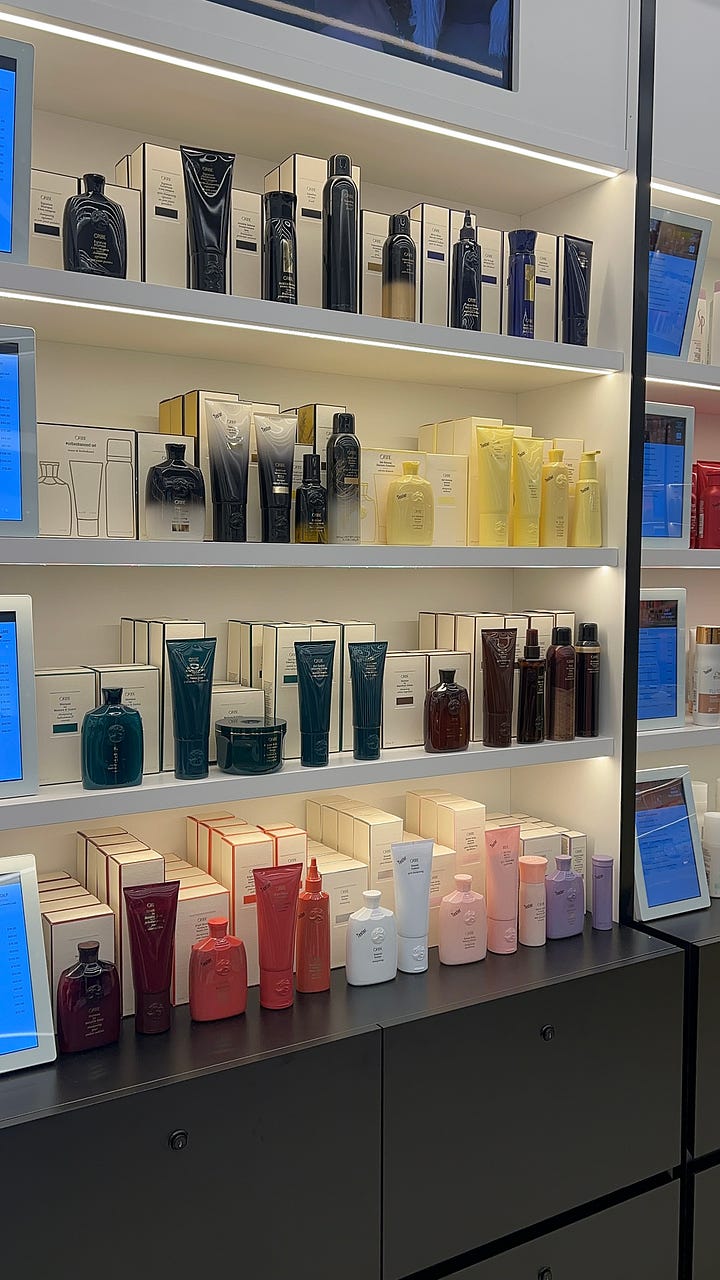
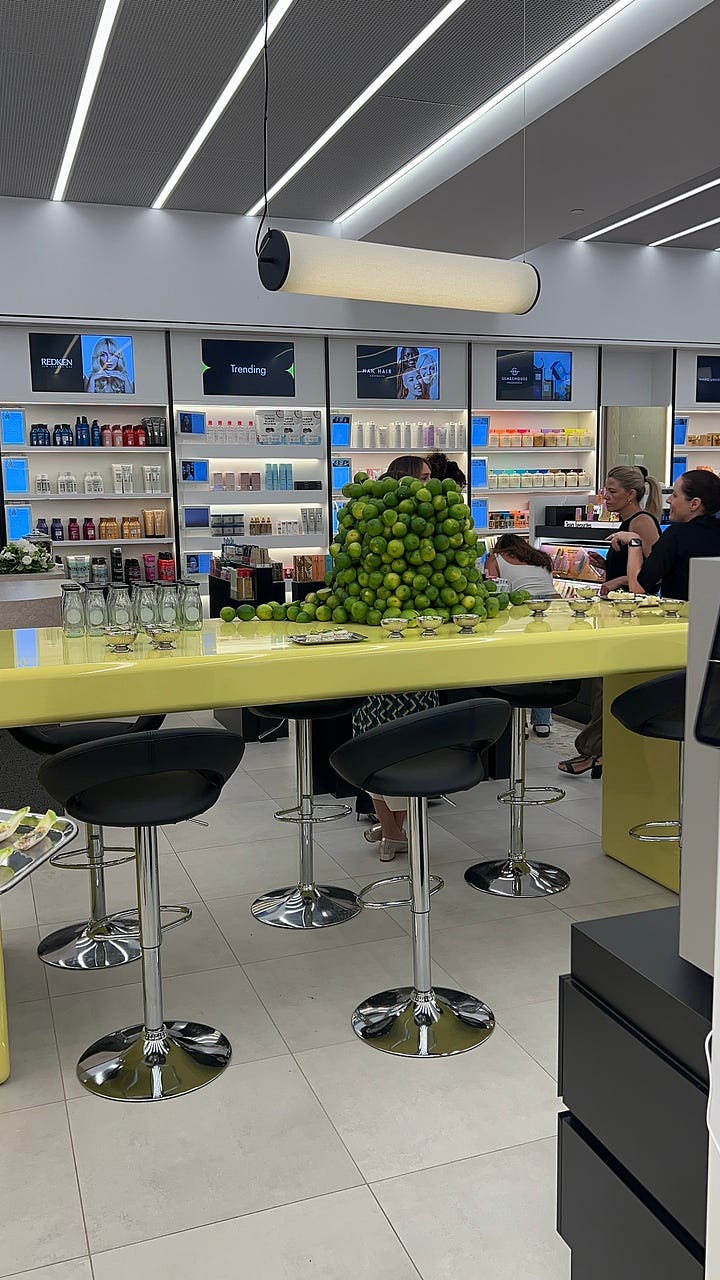
The question here is – does what we want to buy online accurately reflect our interests and appetite for an in-store experience? Working in both the beauty industry and retail for a very long time (frightening to think that 22-year-old Kate was once a store manager), almost every company I've encountered with both an IRL and URL presence finds themselves with entirely separate customers. The returning online customer can be completely different to the in-store regular, with fluctuating motivations across the board.
If Adore Beauty has based most of its decisions on the behaviour of established online personas, there's a chance the strategy may need a few tweaks. There's also the equal chance that it'll prove a genius tactic for easy sales. But all this data points to an interesting opportunity. While Adore Beauty knows its current customer inside and out, the numbers suggest there's a much bigger potential market waiting to be tapped.
Relatable retail
As such, it sounds like a different customer is exactly what Adore Beauty is after. While the business might be gleaning insights from its existing customer database, Laing notes, "The reality is, 87 per cent of beauty sales are done in physical stores. We get over 30 million people visiting the website every year which is an enormous amount of customer engagement, but we're not touching a large portion of the market. We can only take share by opening stores, so for us it's about growing and introducing the brand to new customers."
Adore Beauty hopes to entice the uninitiated by providing a welcoming environment that reflects the 'unfiltered' identity that it has built online. As a heavily content-led business that's known for its informative Beauty IQ platform, Adore Beauty established an identity with educational articles, staff recommendations and social series' early on, launching chart-topping podcasts helmed by the Adore Beauty team and generating a loyal online community that celebrates the website's inclusive, relatable tone.
This community-building success is particularly impressive given how challenging it is to create genuine engagement around an online store. It's a testament to their evident appreciation for (and continued investment in) highly personable content marketing and branding, as well as regularly giving back to its most engaged customers with a robust rewards program, Adore Society. Then there's their signature touch – the Tim Tams that have arrived with every online order since founder Kate Morris began the business from her garage.
The team hopes to translate this ethos to their physical presence, with in-store advisors trained to cater to diverse customer needs and preferences. The focus is on education and relaxed, comfortable interactions – there's even a seated area designed to evoke kitchen table conversations between team members and customers. In keeping with its established online education hub, Adore Beauty will also offer skin consultations using the OBSERV520x complexion analysis system for tailored product recommendations.
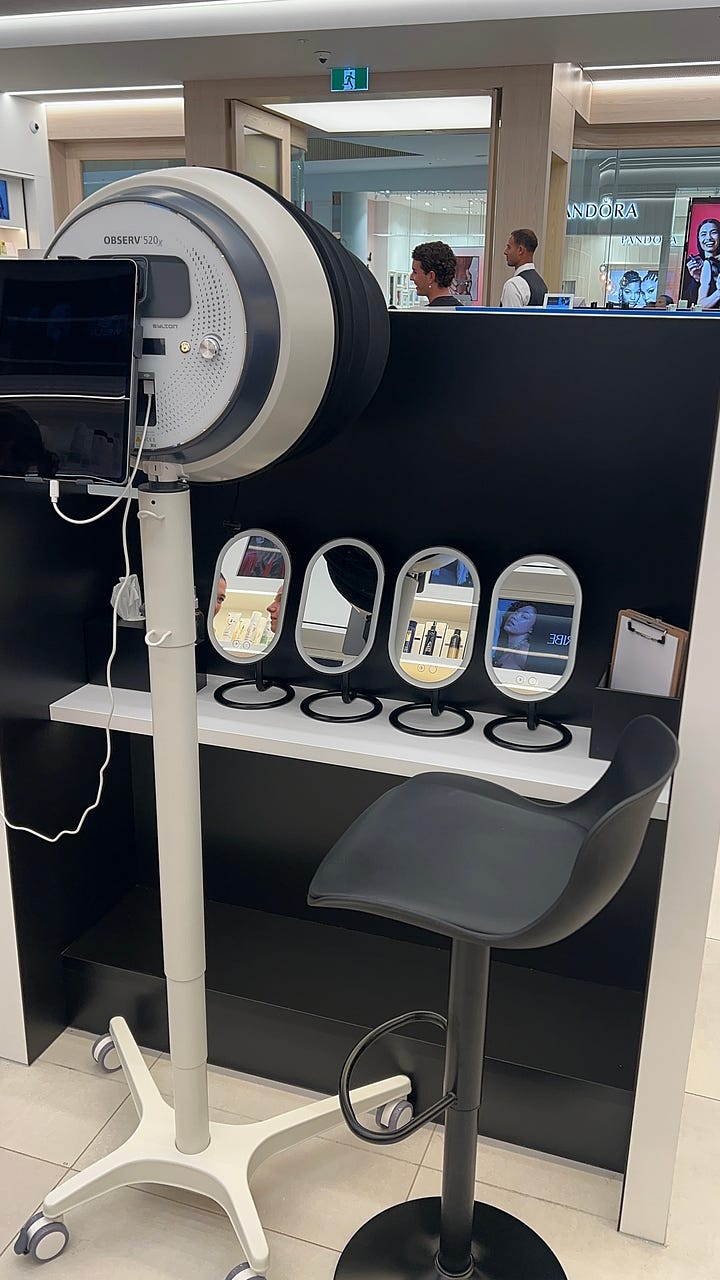
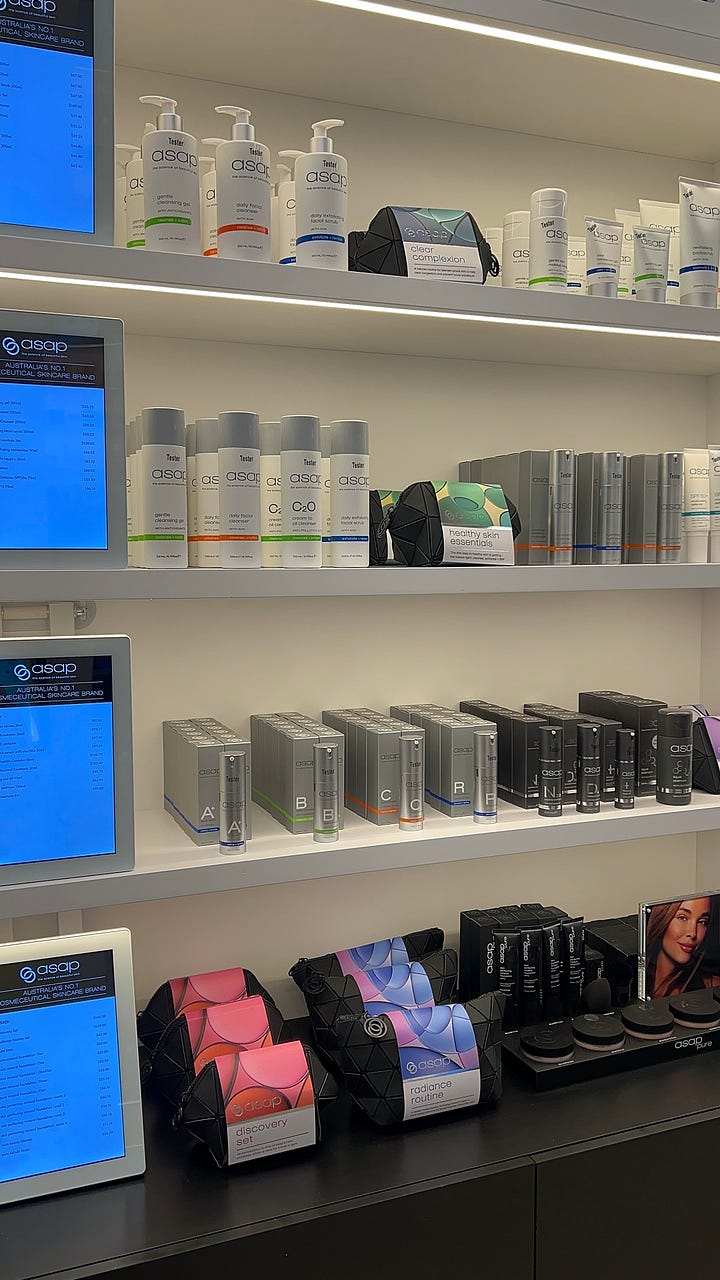
"The conversations that we have on our Beauty IQ podcast are really genuine and honest, and we want that to translate in store as well," says Laing. "We want our customers to feel really comfortable talking to our beauty advisors here while also getting the right advice and education."
So, whose market share is Adore Beauty going after?
A market play for MECCA? Maybe not
If you asked most people who they believe Adore Beauty would like to snag customers from, they'd probably guess MECCA. After all, the beauty giant holds the highest amount of market share in Australia at 16.8 per cent, and was recently named Australia's most-loved beauty retailer by Power Retail, who surveyed more than 12,000 online shoppers. Adore Beauty was a close second and was the sole online-only inclusion, followed by Chemist Warehouse in third, Priceline in fifth and Sephora at number six.
While I'm sure Adore Beauty would love to lure over a few MECCA customers, I don't think that's where their focus will be. MECCA maintains the strength of its position thanks to its Beauty Loop loyalty program, its incomparable brand edit – particularly the highly sought-after international brands that MECCA stocks exclusively – and its engaging customer experience. Adore Beauty will no doubt follow suit in some areas – its own Adore Society program will be amplified by IRL events and offers, stores will have highly knowledgeable beauty advisors, and according to Laing, there will be "some" exclusive brands arriving in the future – but I think the business has its eye on Sephora, Priceline Pharmacy and Chemist Warehouse instead.
Anna Beaton, Adore Beauty's Head of Brand Marketing, tells me that their first-party data demonstrates their customer's appreciation for brands at both ends of the pricing scale. "When you go to our warehouse, you can see the orders in the shop trolleys that have come through," she said. "A typical basket would actually have a cosmeceutical serum with the latest cult Korean beauty product, with something else thrown in, like a cool lip gloss that's $15. What it makes you realise is that most women don't shop one brand, they play with high-low."
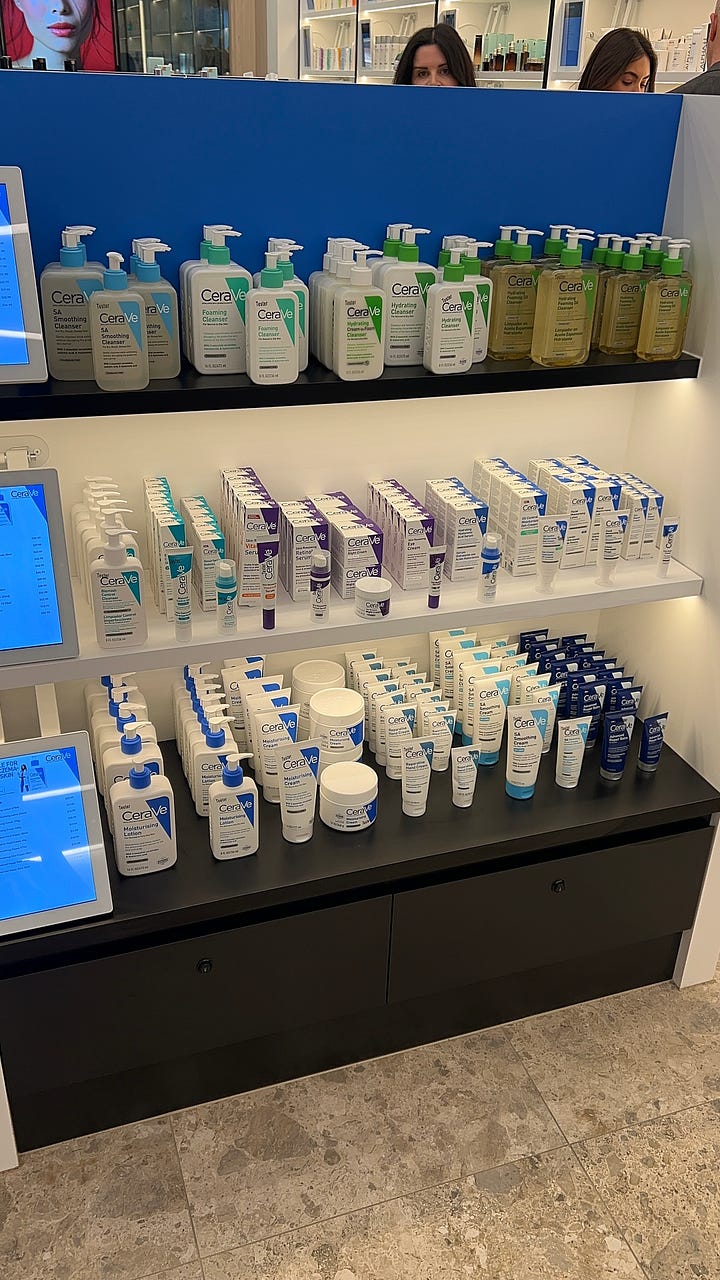
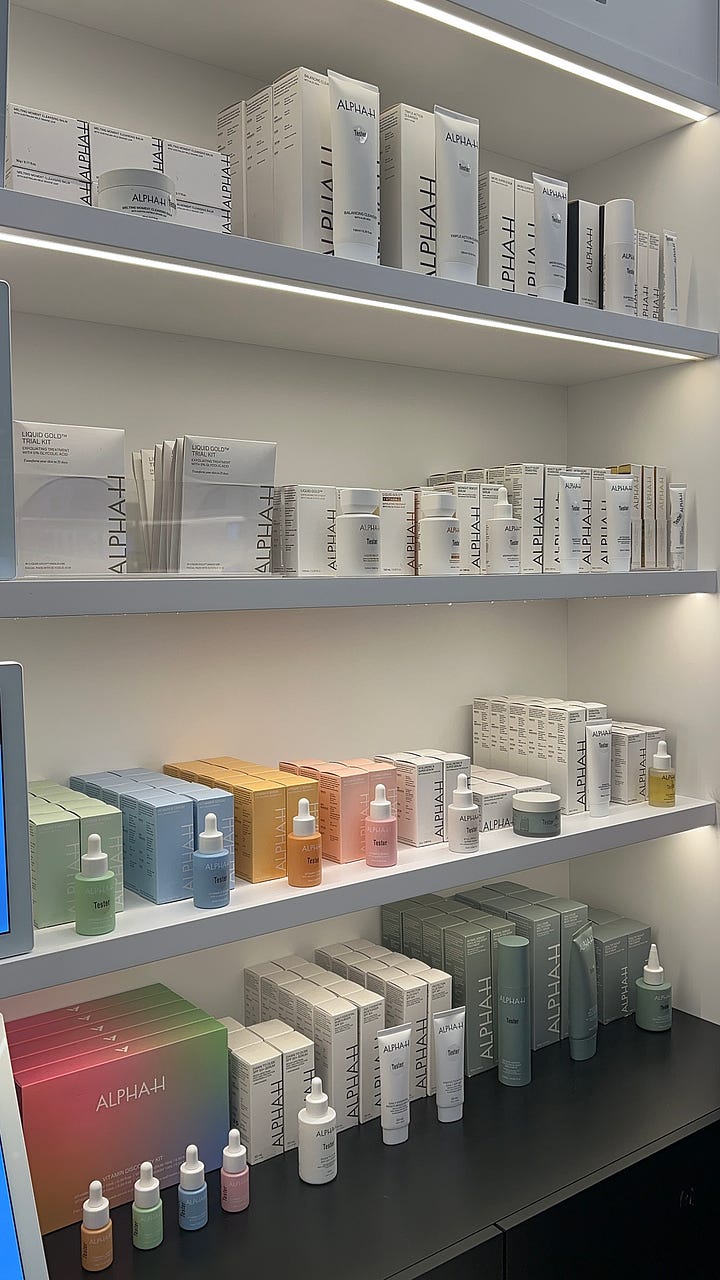
While Sephora, Priceline and Chemist Warehouse boast much smaller online footprints than Adore Beauty, there's significant brand crossover. On the shelves of the new Southland store, I spot niche luxury fragrance brand Goldfield & Banks (also at Sephora), no-frills budget skincare giant CeraVe (stocked at Chemist Warehouse) and mass cosmetics purveyor NYX (you'll find it on shelves at Priceline). Says Beaton, "We're all beauty junkies so we want beauty customers to shop around, discover and play. We're really proud of the mixture of brands we have that gives customers permissibility to actually shop both high and low, which doesn't exist elsewhere."
Chemist Warehouse and Priceline target budget-conscious shoppers – increasingly, beauty-obsessed, cash-strapped 18 to 24-year-olds – with an affordable price point that is placed at a higher priority than customer service. Both are aiming to elevate their in-store offering (Chemist Warehouse introduced its Ultra Beauty concept in 2022, while Priceline made its own attempt with Atomica last year to mixed reception) but Adore Beauty's store boasts a more sophisticated aesthetic. There you'll find high-end cosmeceutical skincare sitting alongside $4 sheet masks with live digital pricing panels that reflect what's discounted (no neon sale tickets in sight).
Sephora's customer, meanwhile, is probably closer to Adore Beauty's core demographic, which Laing tells me is mostly women aged 25 to 45. They have greater disposable income, value beauty brands that are more premium in nature, but they expect a better customer experience as a result. Sephora carries a number of international exclusives, such as Rare Beauty, Paula's Choice and Makeup By Mario, but a significant bulk of their brands are also stocked on Adore Beauty.
Sephora's most obvious bricks-and-mortar competitor is MECCA, but it has consistently fallen short for the consumer on both customer service and sheer volume of store locations. Would Adore Beauty be a more fitting adversary?
Will it work?
As of now, Sephora has a little more than 30 stores in Australia. With Adore Beauty's commitment to open 25 stores over two years, it has the potential to catch up to the LVMH-owned retailer very quickly. If Adore Beauty can tap into the image that it has built online as a relatable, engaging voice and trusted source of beauty education for Australian women, Sephora might just see some of its millennial and gen X customers making the switch. The same demographic could also spend less cash at Priceline and Chemist Warehouse, opting for a more boutique experience with engaging service and a range of price points at Adore Beauty (not to mention the Tim Tam drawcard).
Adore Beauty says that its store mix remains adaptable to the data that it will get from its first-time physical shoppers. "We've got 55 of our 300-odd brands here at Southland, and we'll continue to learn in terms of what customers are engaging with," Laing says, adding that the team will continue to evolve and expand the product assortment. "We've got some international brands coming in the middle of the year, some of which are exclusive and others that we've been working with for some time."
In my opinion, Adore Beauty has got a real shot with in-store beauty shoppers. Will they ever succeed the monolith that is MECCA? It's highly unlikely, but that doesn't appear to be Adore Beauty's MO anyway. What they can do is look to MECCA's proven strategies and combine the relevant successes with their own extensive first-party data, in a bid for a different demographic – one that shops sales but appreciates quality and performance in equal measure, or those that really crave education, but don't always feel all that confident asking for it.
By carving out this distinct space in Australian beauty retail – where high meets low, and approachability meets expertise – Adore Beauty might just prove that there's room for one more in a seemingly overcrowded market.





Would love a follow up on this! This article is super interesting and I love anything to do with dissecting Mecca’s brand
This is fantastic!! Adore are so advantage in customer analytics and it shows. So interested to see this roll out in store. Loved loved loved this read❤️